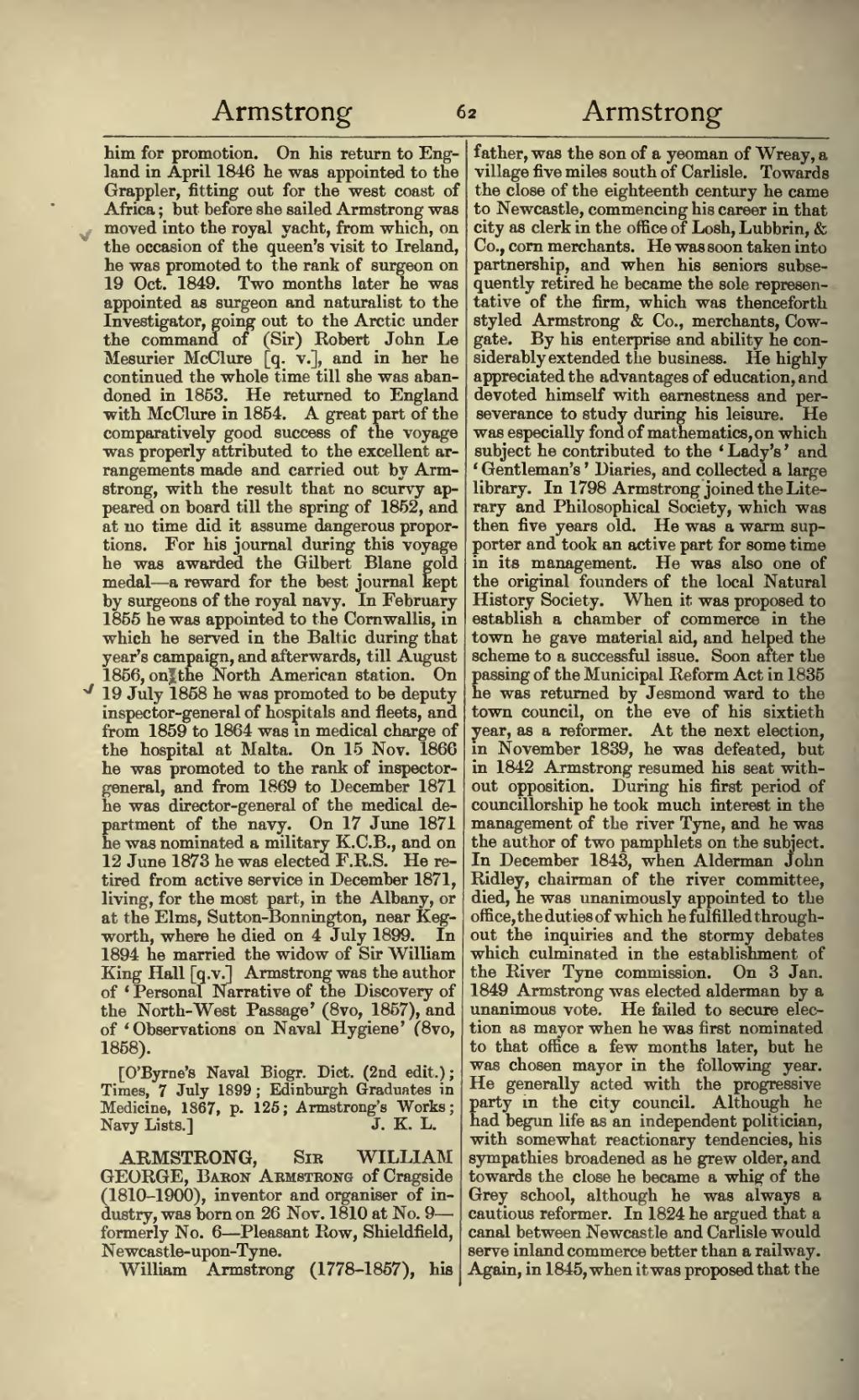him for promotion. On his return to England in April 1846 he was appointed to the Grappler, fitting out for the west coast of Africa; but before she sailed Armstrong was moved into the royal yacht, from which, on the occasion of the queen’s visit to Ireland, he was promoted to the rank of surgeon on 19 Oct. 1849. Two months later he was appointed as surgeon and naturalist to the Investigator, going out to the Arctic under the command of (Sir) Robert John Le Mesurier McClure [q. v.], and in her he continued the whole time till she was abandoned in 1853, He returned to England with McClure in 1854. A great part of the comparatively good success of the voyage was properly attributed to the excellent arrangements made and carried out by Armstrong, with the result that no scurvy appeared on board till the spring of 1852, and at no time did it assume dangerous proportions. For his journal during this voyage he was awarded the Gilbert Blane gold medal—a reward for the best journal kept by surgeons of the royal navy. In February 1855 he was appointed to the Cornwallis, in which he served in the Baltic during that year’s campaign, and afterwards, till August 1856, on the North American station. On 19 July 1858 he was promoted to be deputy inspector-general of hospitals and fleets, and from 1859 to 1864 was in medical charge of the hospital at Malta. On 15 Nov. 1866 he was promoted to the rank of inspector-general, and from 1869 to December 1871 he was director-general of the medical department of the navy. On 17 June 1871 he was nominated a military K.C.B., and on 12 June 1873 he was elected F.R.S. He retired from active service in December 1871, living, for the most part, in the Albany, or at the Elms, Sutton-Bonnington, near Kegworth, where he died on 4 July 1899. In 1894 he married the widow of Sir William King Hall [q.v.] Armstrong was the author of ‘Personal Narrative of the Discovery of the North-West Passage’ (8vo, 1857), and of ‘Observations on Naval Hygiene’ (8vo, 1858).
[O’Byrne’s Naval Biogr. Dict. (2nd edit.); Times, 7 July 1899; Edinburgh Graduates in Medicine, 1867, p. 125; Armstrong’s Works; Navy Lists.]
ARMSTRONG, Sir WILLIAM GEORGE, Baron Armstrong of Cragside (1810–1900), inventor and organiser of industry, was born on 26 Nov. 1810 at No. 9—formerly No. 6—Pleasant Row, Shieldfield, Newcastle-upon-Tyne.
William Armstrong (1778–1867), his father, was the son of a yeoman of Wreay, a village five miles south of Carlisle. Towards the close of the eighteenth century he came to Newcastle, commencing his career in that city as clerk in the office of Losh, Lubbrin, & Co., corn merchants. He was soon taken into partnership, and when his seniors subsequently retired he became the sole representative of the firm, which was thenceforth styled Armstrong & Co., merchants, Cowgate. By his enterprise and ability he considerably extended the business. He highly appreciated the advantages of education, and devoted himself with earnestness and perseverance to study during his leisure. He was especially fond of mathematics, on which subject he contributed to the ‘Lady’s’ and ‘Gentleman’s’ Diaries, and collected a large library. In 1798 Armstrong joined the Literary and Philosophical Society, which was then five years old. He was a warm supporter and took an active part for some time in its management. He was also one of the original founders of the local Natural History Society. When it was proposed to establish a chamber of commerce in the town he gave material aid, and helped the scheme to a successful issue. Soon after the passing of the Municipal Reform Act in 1835 he was returned by Jesmond ward to the town council, on the eve of his sixtieth year, as a reformer. At the next election, in November 1839, he was defeated, but in 1842 Armstrong resumed his seat without opposition. During his first period of councillorship he took much interest in the management of the river Tyne, and he was the author of two pamphlets on the subject. In December 1843, when Alderman John Ridley, chairman of the river committee, died, he was unanimously appointed to the office, the duties of which he fulfilled throughout the inquiries and the stormy debates which culminated in the establishment of the River Tyne commission. On 3 Jan. 1849 Armstrong was elected alderman by a unanimous vote. He failed to secure election as mayor when he was first nominated to that office a few months later, but he was chosen mayor in the following year. He generally acted with the progressive party in the city council. Although he had begun life as an independent politician, with somewhat reactionary tendencies, his sympathies broadened as he grew older, and towards the close he became a whig of the Grey school, although he was always a cautious reformer. In 1824 he argued that a canal between Newcastle and Carlisle would serve inland commerce better than a railway. Again, in 1845, when it was proposed that the
